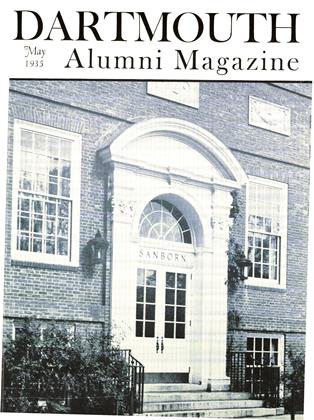TOWARD THE END of May there was the faculty to conjure with. The sun shone on the campus, but exams had to be passed or flunked in the chill gloom of the gymnasium. Many a freshman marched haltingly down to the dread portals, faced with the inevitable prospect of forgetting half or more of Doc Bowler's grim commandments.
You think of Hanover in terms of fraternity houses and Winter Carnivals and Big Green teams. But any class could bring back in an instant its hundreds of individual recollections of what went on in the classrooms. Strange how the memory of professorial personalities lingers. Stranger yet to think of Dartmouth without Gene Clark and Freddy Emery and Charlie Lingley, all the best of good friends, whose scholarship was cloaked in the warmth and color of humanity. Gene Clark could make you feel at home in the Ad Building. Freddy Emery gave life to literature, because he knew boys and loved his subject and built up no cloud of pretentious mystery about it. Charlie Lingley gathered a group around a table in Wentworth and taught history and biography interchangeably in terms of men who lived and events that moved.
Many others are gone now also. Roule is dead, the suave Frenchman, whose very intonations gave green kids from the sticks a glimpse of Paris; and Johnny Poor, perhaps the last and surely one of the best beloved of the faculty "characters." In our own time Chet Phillips packed up his belongings and left—calm, inscrutable, wise, and greatly esteemed. The grave, resonant voice of Ben Marshall, as much a part of the day's beginning as the tolling of the chapel bells, was sadly missed when he too moved on to a new destiny elsewhere.
But also in our time new faces appeared among the faculty. Jim Richardson took command of the Poli Sci department—good lawyer, good politician, good teacher, and good fellow. Harry Wellman came to the Tuck School, a likeable business man who had put together a book of songs. Unendingly the procession was changing, and still changes.
Perhaps, too, the things they teach and the ways they teach them are altered with the times. Remember the freshman English themes? Three a week, each a page-long paragraph; description, narration, exposition, and whatever the fourth one is. If the subject was the trough and the point of view was fixed, you darned well fixed your point of view and put down what you saw from there—or knew considerably better the next time. Fancy was allowed no flights from the fundamentals. There was no apparent escape, either, from freshman math; and only the military maneuvers in the spring of 1917 saved many of us from the horrors of analytical geometry.
Does more and better learning emanate, do you suppose, from behind the lovely architectural mass of the new Tuck School? Surely the spirit of literature must have found a home beneath the tower of the Baker Library and amid the sumptuous elegance of Carpenter. Yet the ramshackle offices and classrooms of Wentworth and Dartmouth Hall harbored their own talents fifteen and twenty years ago. Grover Cleveland Loud, fresh from a New York newspaper, fired the young with a zeal for journalism. Judge Harry Burton brought Horace safe out of his Latin syntax.
"Don't hunt for the subject and the predicate," he would say. "Read the thing as you see it and it will come out all right." William Kilborne Stewart "compared" literature in such a way that the great thinking of past centuries still lives for many of his students. Things may be better now; all credit to them. We had our share.
 View Full Issue
View Full Issue
More From This Issue
-
 Article
ArticleHANOVER BROWSING
May 1935 By Herbert F. West '22 -
 Article
ArticleHANOVER SUBMERGED
May 1935 By Richard J. Lougee '27 -
 Class Notes
Class NotesClass of 1918
May 1935 By Allan C. Gottschaldt -
 Class Notes
Class NotesClass of 1930
May 1935 By Albert I. Dickerson -
 Class Notes
Class NotesClass of 1904
May 1935 By David S. Austin, II -
 Class Notes
Class NotesClass of 1905
May 1935 By Arthur E. McClary
R. M. Pearson '20
-
 Article
ArticleNot So Long Ago
October 1934 By R. M. Pearson '20 -
 Article
ArticleNot So Long Ago
March 1935 By R. M. Pearson '20 -
 Article
ArticleNot So Long Ago
April1935 By R. M. Pearson '20 -
 Article
ArticleNot So Long Ago
November 1935 By R. M. Pearson '20 -
 Article
ArticleNot So Long Ago
February 1936 By R. M. Pearson '20 -
 Article
ArticleNot So Long Ago
March 1936 By R. M. Pearson '20







